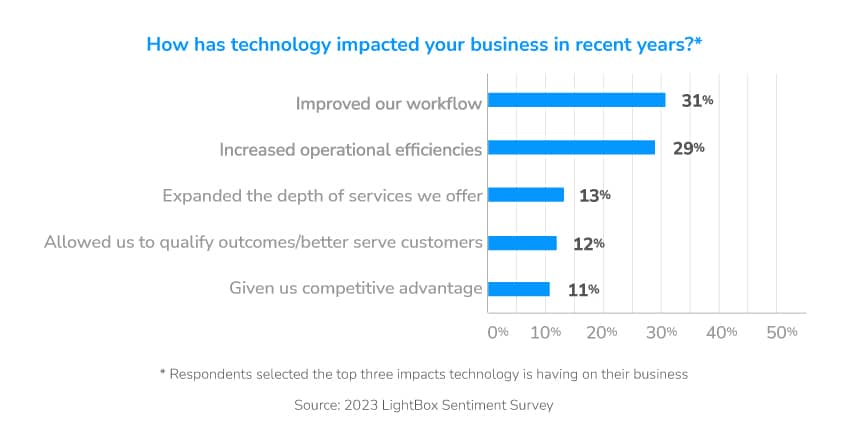LightBox Mid-Year Sentiment Report: Technology is driving change.
- CRE professionals increasingly rely on technology to improve efficiency and streamline workflows.
- Among technological advances, structured data is seen as more important than automation.
- Artificial intelligence (AI) has the potential to automate a variety of tasks and revolutionize the industry, but it has yet to see widespread use.
The LightBox 2023 Mid-Year Sentiment Report looks at the complex market conditions which exist across the commercial real estate lending, broker, investment, appraisal, and environmental due diligence sectors. The findings, analyzed and expanded upon through interviews with commercial real estate industry experts, point to challenges and opportunities across the ecosystem. Among other things, the report highlights the critical role of technology in solving real estate’s business challenges.
How is technology changing the commercial real estate industry?
In response to intense market pressures to close deals quickly, technology is playing an increasingly important role in enabling professionals across the industry to improve efficiency, accuracy, and reporting. CRE respondents to the survey view the benefits of technology in terms of operational benefits such as addressing process inefficiencies and workflows more than as a way to gain competitive advantages or quantify outcomes to better serve customers.
Market report of increasing efficiency in commercial real estate by technology advancements
For survey respondents, technology has helped improve workflow (31%), increased operational efficiencies (29%), expanded the depth of services offered to customers (13%), allowed firms to qualify outcomes and better serve customers (12%), and provided competitive advantage (11%).
In the appraisal community, respondents focused on challenges associated with desktop appraisals and the impact on banking relationships. While technology improved some processes with appraisals, respondents also noted concerns about reducing reliance on traditional appraisals.
Structured and normalized data, along with market research, was at the top of technological improvements which would help respondents address business challenges (38%), followed by automation (24%), central management of functions (19%), and outsourcing (9%).

Use of AI and Commercial Real Estate data
Artificial intelligence and ChatGPT have been the latest headline-makers in commercial real estate as businesses experiment with ways these new technologies can automate certain labor-intensive aspects of operations. Ninety percent of survey respondents said they don’t know much about these technologies, while nine percent are “playing around with them” and one percent are actively using them on projects. AI has the potential to revolutionize many areas in commercial real estate:
- Property search and selection: AI-powered platforms can provide more efficient, personalized, and sophisticated property search experiences. They can analyze vast amounts of data to predict which properties are most likely to meet a client’s specific needs, considering factors like price, location, and amenities.
- Valuation and investment analysis: Machine learning algorithms can analyze large datasets and predict property values, considering factors such as property condition, neighborhood characteristics, economic trends, and comparable sales data to produce accurate estimates, helping investors make informed decisions about buying, selling, and investing in commercial properties.
- Risk assessment and mitigation: AI can help identify and assess potential risks related to properties by analyzing data such as environmental risks, market volatility, regulatory changes, and tenant stability to help companies avoid potential losses.
- Marketing and leasing: Users can create targeted marketing strategies by analyzing tenant data and predicting which types of businesses or individuals are most likely to lease a given property and streamline the leasing process by automating document creation and management.
- Sustainability: AI can help developers build sustainable buildings by optimizing energy consumption, reducing the carbon footprint, saving on utility costs, and implementing and tracking sustainable practices and certifications.
- Construction and development: AI can be used in the design and construction of commercial real estate, optimizing site selection by evaluating locational attributes, environmental factors, and the builder’s preferences.
- Chatbots for client queries: AI-driven chatbots can handle routine queries from clients about the appraisal process or specific reports. This can free up more time for appraisers to focus on complex tasks which require human expertise.
- Data extraction from unstructured sources: The CRE industry has long relied on unstructured data trapped in documents. Logic-learning machines equipped with natural language processing capabilities can analyze text-based data such as online reports, news articles, public records, environmental reports, appraisals, loan documents, etc., and extract valuable insights.
Several survey respondents noted the importance of relationships in getting deals done, an element technology can’t automate, but regardless of where they stand now, professionals across the CRE industry are increasingly likely to deploy AI and ChatGPT as they seek new ways to remain competitive and better serve their clients.
For a more in-depth understanding, read the LightBox 2023 Mid-Year Sentiment Report — you’ll gain insights from commercial real estate industry experts on the critical role of technology in solving business challenges, the use of new AI applications like ChatGPT, and the growing importance of climate risk in dealmaking.
